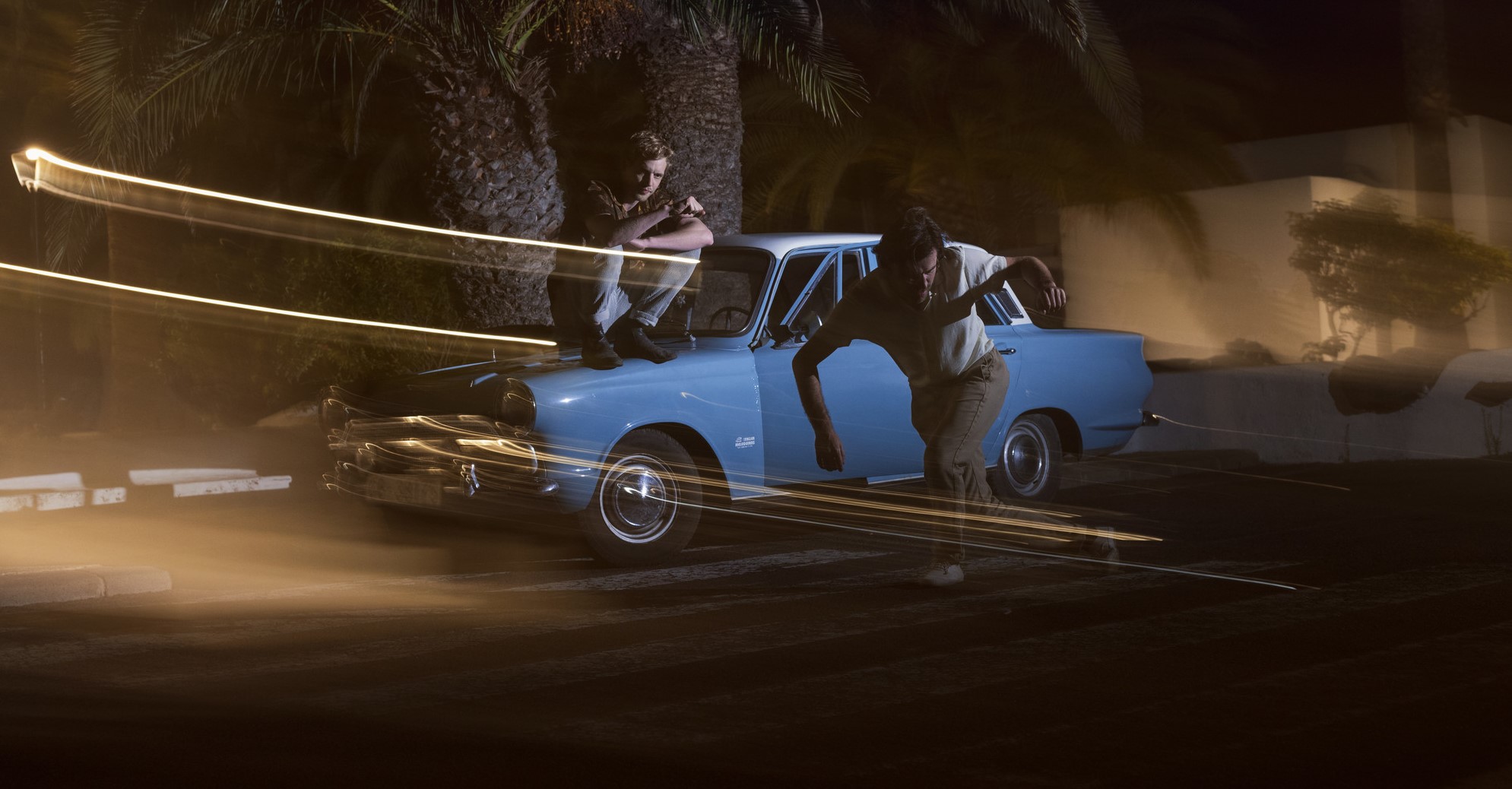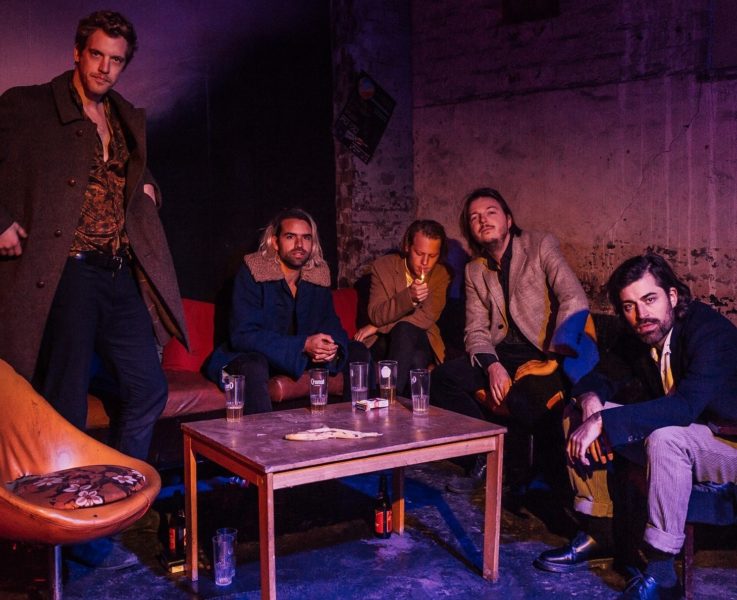From ‘Applause’ to pause
It was in May 2015 after Balthazar just finished another full month of touring for their third record Thin Walls when they felt that some kind of change was necessary. The processes of the music industry became an automatism and the five members found themselves stuck in that ongoing cycle: Recording, promoting, releasing, touring – and all over again. ‘When you’re in a band like Balthazar it really takes over your life, it’s a lifestyle I guess.’, one of the two frontmen Jinte Deprez says while looking back. With the loss of drummer in 2014 the band already had to pay tribute for that lifestyle. Then, one year later, after nearly six years of constantly being on the road since the release of their debut record Applause in 2010, the band had to face the next loss: Violin player Patricia Vanneste left the band. The remaining four musicians decided to hit the pause button. ‘We kind of felt that it was dangerous to make another bouncer album in the sense that it was getting too much of a routine. And we wanted to avoid that by taking a break, because we thought it would be healthy.’ singer Jinte says reflecting on the self-imposed break.
But the years since then have been anything but a relaxing sabbatical. Three of the four remaining members came up with solo projects, which again included the inevitable processes of recording, promoting, releasing and touring. But this time it was an exciting new experience. Jinte Deprez created the alter ego J.Bernard and released a souly R&B and hip hop infected record, the other frontman Marteen Devoldere even released two records under the name Warhaus and bass player Simon Casier created Zimmerman and released a lo-fi indie rock album sounding like The Strokes.
It was definitely not the lack of a creative output, but the wise foreseeing that the band constellation might be on the brick of imploding, if not given enough space and time. So for about three years, Balthazar fell apart into its pieces with everyone trying out their luck and getting new impression by working with other people. Once you don’t have a band to hide behind, but you’re the one on stage as the leader of your own formation, as performer of your own – and only your own – creative output, it’s at the same time a big opportunity, but also goes along with risks of failure.
‘The solo projects were really refreshing. But then also you’re the only one with the responsibility. It’s not that easy to do it all by yourself. So in a way, those new discoveries working solo made sure that we were super at ease coming back together. And when you come back together with a bunch of people there is a certain energy which you can never create in a solo project.’
Transferring that energy into the writing process and taking it into the studio might be difficult, with three bandmembers having become used to working in an environment, where they could blow up their ego without having to make compromises or arrangements. But Balthazar is not that kind of a constellation. It was clear from the beginning, that were would be a new record as a band at some point in the future, and while the solo projects were a self-fulfilling experience for each of the individuals, it also strengthens the bound within the band by seeing what potential everyone bears inside of them: ‘When I heard Warhaus for the first time I was super surprised and proud. When you work together since you were sixteen years old, you think you know each other very well and you take each other a little bit for granted. It’s cool to have a wake-up-call from that.’
Taking a break just to realize that what you had was pretty much the best you could possibly get, is probably the best outcome of an self-imposed pause in any kind of relationship. ‘In the solo projects everyone was a really big fan of each other’, Jinte says honestly, with no sign of jealousy.
Changes won’t change them
The inspiration the musicians collected by working on their own left their mark on the new record – it’s only a logical consequence. The decent usage of synthesizers, a new-found pop appeal and easiness and a heavy gravitation towards the dancefloor can be seen as a left-over, or more of a lesson learned from the solo adventures. Leaving the indie rock comfort zone and reaching out to different genres was a profound experience for all musicians. It not only widened their musical horizons, but also took the fear of the unknown.
Lines like ‘Changes won’t change us honey, or maybe I just hope they won’t’ in the song Changes are predesigned to be interpreted as analysis of the band’s experience of the past three years. ‘It’s funny, because we get to hear more and more interpretations for our music,’ Jinte responds with a laugh. ‘I think it’s all very romantic but, when you write songs, you mainly write out of a personal perspective. So the song Changes is about that you think you want to change your bad habits but it doesn’t work, and at the end you actually feel that you don’t want to change. It’s more of a dialog with yourself instead of an analysis our band.’
But the fact that there are changes on Fever is not neglectable. First of all, Dave, a good friend of the band ‘who can play every instrument you can imagine’, took over Patricia Vanneste’s spot as a violin player. Since Patricia was in the band from the very beginning, the effect of that loss might only reveal itself as time goes by. ‘We will defiantly feel it on tour. It feels like an amputation but then on the other hand it’s also a new opportunity do to something else.’
The new record also goes along with a new way of recording. After the band’s first two records were produced by themselves and the third one in very a classic way by a British producer within three weeks of recording in England, the band decided to go a different path and bring it back to the family. Or let’s say extended family: Jasper Maelkelberg, also a good friend of the band, ‘who knows Balthazar through and through’ (and who will support them on their upcoming tour with his band Faces On TV) was responsible for bringing the new ideas into a record. ‘He had a vision of how we needed to tackle the new album. And I think Jasper was the perfect guy. He did a lot in the solo projects as well, so he knew how to make the balances of everything what we have done before and what we wanted to do in the future.’ The friend like relationship between band and producer was a key to the new sound concept.
In December 2017 the band started writing songs again and met up for writer-sessions with Jasper. Because there were still some shows of the solo projects scheduled, the writing process was of several shorter sessions, and not a constant brewing over ideas: ‘It was cool, because we could work very intensively for a week and then go on tour again and get some distance from what we’ve created. So it was very different process’. It prevented the band from getting stuck in a bubble and gave the opportunity to take some of that freshness of working with other people back into the writing process. Through the intervals of touring there was a constant reminder, that you don’t have to tie yourself to a particular sound and new things only seem dangerous, if your perspective on them is narrowed down.

A new found easiness
The room for creativity and adventuresses, that was wide open during their solo work, was something the band didn’t want to miss when working together again: ‘I think what we mainly learned is a change in the mentality. In the solo projects we tried to be as playful as we could, especially live. I think that was the most important thing to take with us to Balthazar.’
That new playfulness reveals itself in pulsating synthesizers, African percussion, techno beats, atmospheric sound scapes and oriental sounding string arrangements. On previous records, that would sound out of place, but on Fever it feels like a natural evolution. ‘I think because we tried it out in the solo projects, we were less afraid to do them.’ As if the solo projects brought something to the surface, that was hidden under the indie rock facade the whole time but wasn’t ready to be explored.
‘Everything was a hidden side of Balthazar before, and some of it came out in the solo project and some of it came out in the new Balthazar album.’
That the new record sounds more adventurously and playful is ironically a result of the process of growing up and becoming an more experienced musician: ‘When I listen back to it, the album Rats is a very serious album. Whereas now the one is way less pretentious in that way. I think we got more playful and more childish – but maybe you have to grow up to discover the child inside of you.’

‘Fever’, the new album
Need another example? The picture of the artwork for the new record is not rooted in any deep, meaningful thought process, reflecting some hidden inner emotion of the songs. It was taken from a National Geography magazine, that happened to be at the right place to the right time during one of the writer-sessions. ‘The photo was on page seven. We thought it was really funny the way they posted. It’s like a band: There is a lead singer looking directly into the camera, and there is a guy staring into the void, that’s obviously the drummer.’ Jinte says with a childish laugh. That the pictures pops up as the second result on google when searching for ‘African wild dogs’ and the fact, that the band is not making a mystery about it, proves the new found easiness and serenity.
But besides all the easy going vibe, the new record also proves that the musical ambitions are still high. Slow tempo and laid back songs with interesting flows are one side of Balthazar in 2019 and reveal their passion for creating atmospheric and at the same time groovy music, with elaborated string arrangement and thoughtful placed rhythmic and melodic elements – standing side by side to the feel-good dance tracks, that cover most of the record.
The right break at the right time
The upcoming tour will be challenging in many ways: First time being on stage as Balthazar after a four-year break, a new member that needs to be integrated, a new sound, that needs to be elaborated, be transferred from the record onto stage and into the audience. But Jinte is just as optimistic about the upcoming tour as the record sounds: ‘I think this album is going to be a really cool album to perform live, because it’s very extrovert and very danceable. In a way it’s going to be a big difference to the previous tours.’ That the upcoming tour will bring the band to even bigger venues that before the break is at the same time surprising and a conformation, that taking that break was a wise decision and a boost for the band in more than one way, musically and interpersonally. ‘We took each other a little bit for granted in all these years and when you’re not working together you realize that it’s very precious to have a band together. And so in a way I think we are more grateful for each other now.’
If a statement like this is the result of stepping back from the band, that decision four years ago might have been the best Balthazar has ever made.



